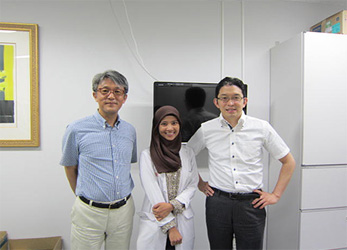Clinical Exchange in Japan
Welcome to Japan and Nagoya University school of Medicine!
Experience Report
Ms. Yusrina Adani from Indonesia
period: June - August 2014
Study in Cardiology Department
My internship started in June 16, 2014 after arrangement with Prof. Kasuya about the internship schedule. At my first day I went to the International Affair office and go to the department where I was introduced to Dr. Bando, associate professor in Cardiology Department, and to the medical and nursing staff. Here, Prof. Murohara, head of Cardiology Department, was always willing to explain me the patients’ history during the professor rounds and to discuss the often complicated treatment of cardiac disease. I was happy that I am allowed to spend a lot of time in the catheter laboratory, where I could attend different interventions for coronary angiographies, stent placement, and laser ablation and cryoablation for arrhythmia. One of the problem that I had was when it came to professor round every Tuesday in the Cardiology ward and the conference every Monday night. They will only speak in Japanese but luckily, one of the doctors would usually translate the information for me.


(top: with dr. Murohara, dr. Bando, doctors, and interns; below: with dr. Usui, dr. Yoshida, doctors)
Study in Cardiac Surgery Department
I had a really great time at the department of Cardiac Surgery. Professor Usui and other doctors in the department was really nice to me. Most of the time I have to be in the hospital at 7.30 for morning conference and the surgery will start at 9 am. I got the chance to see every operations and even scrub-in and participate some of the surgeries. The life style of the surgeons here are much different from Indonesia. In Indonesia, surgeons are too busy in clinical works and only have a little time to do research or other stuffs, meanwhile in Japan I think they have time to do both.
Study in Gastroenterology Department
I was well received in the endoscope room and impressed by the hospitality of Prof. Goto and Prof. Ando. Dr. Matsushita and Dr. Funasaka taught me what we need to see when performing endoscopy and showed me various lesions and disease. During my study here, there is one gastroenterologist from Thailand, Dr. Tanya, who is taking endoscopy training for 2 years. She also patiently utilized the model to teach me the basic ways to perform a upper and lower GI examination. When I am with her, she always explained what is going on in the procedure and about the disease, we also often had nice discussion back then.


(top: with GE doctors in front of endoscopy room; below: with dr. Ando and doctors)
Study in Radiology Department
My last department, Radiology, offers an overview of most areas of medicine, including medical and surgical specialty. In the first week, I learned about radiodiagnosis and the second week I learned about radiotherapy (which is actually very interesting!) I had a schedule for the week and I was assigned to different staffs concerned with different sections. Most of the time, I learned to read CT and MRI images. The staffs were very kind to explain me in English. I could also give my views, this accompanied correct and incorrect responses with explanations for further understanding. In radiotherapy week, I rceived a lot of new knowledge from Dr. Kawamura especially about Japan being one of the biggest center for proton-radiotherapy (a new way to get rid of cancer) and the center number is larger than in US.
The last thing I wanted to talk about is the language-barrier. I realized that I had to study the Japanese language because English is a no-go, but back then I didn’t have time to take any formal Japanese language course, so I flew to Japan armed only with the dictionary application in my phone. My program, NUPACE, provided me with language course at my first 1,5 months, of course it wouldn’t be enough but at least I can speak basic conversation in daily life. But my skills in Japanese were basically 0. In the hospital, many doctors and some of the Japanese interns also speak English though only a few nurses speak English. Communication with the doctors was my only option to gather the information.

(with dr. Kasuya, dr. Kondo)
Click here to read other stories
Nagoya University Graduate School of Medicine